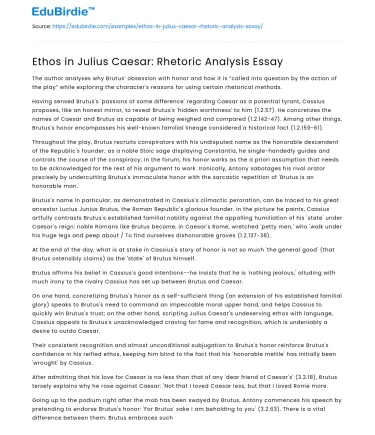The author analyses why Brutus’ obsession with honor and how it is “called into question by the action of the play” while exploring the character's reasons for using certain rhetorical methods.
Having sensed Brutus's 'passions of some difference' regarding Caesar as a potential tyrant, Cassius proposes, like an honest mirror, to reveal Brutus's 'hidden worthiness' to him (1.2.57). He concretizes the names of Caesar and Brutus as capable of being weighed and compared (1.2.142-47). Among other things, Brutus's honor encompasses his well-known familial lineage considered a historical fact (1.2.159-61).
Save your time!
We can take care of your essay
- Proper editing and formatting
- Free revision, title page, and bibliography
- Flexible prices and money-back guarantee
Throughout the play, Brutus recruits conspirators with his undisputed name as the honorable descendent of the Republic's founder; as a noble Stoic sage displaying Constantia, he single-handedly guides and controls the course of the conspiracy; in the forum, his honor works as the a priori assumption that needs to be acknowledged for the rest of his argument to work. Ironically, Antony sabotages his rival orator precisely by undercutting Brutus's immaculate honor with the sarcastic repetition of 'Brutus is an honorable man.'
Brutus's name in particular, as demonstrated in Cassius's climactic peroration, can be traced to his great ancestor Lucius Junius Brutus, the Roman Republic's glorious founder. In the picture he paints, Cassius artfully contrasts Brutus's established familial nobility against the appalling humiliation of his 'state' under Caesar's reign: noble Romans like Brutus become, in Caesar's Rome, wretched 'petty men,' who 'walk under his huge legs and peep about / To find ourselves dishonorable graves (1.2.137-38).
At the end of the day, what is at stake in Cassius's story of honor is not so much 'the general good' (that Brutus ostensibly claims) as the 'state' of Brutus himself.
Brutus affirms his belief in Cassius's good intentions--he insists that he is 'nothing jealous,' alluding with much irony to the rivalry Cassius has set up between Brutus and Caesar.
On one hand, concretizing Brutus's honor as a self-sufficient thing (an extension of his established familial glory) speaks to Brutus's need to command an impeccable moral upper hand, and helps Cassius to quickly win Brutus's trust; on the other hand, scripting Julius Caesar's undeserving ethos with language, Cassius appeals to Brutus's unacknowledged craving for fame and recognition, which is undeniably a desire to outdo Caesar.
Their consistent recognition and almost unconditional subjugation to Brutus's honor reinforce Brutus's confidence in his reified ethos, keeping him blind to the fact that his 'honorable mettle' has initially been 'wrought' by Cassius.
After admitting that his love for Caesar is no less than that of any 'dear friend of Caesar's' (3.2.18), Brutus tersely explains why he rose against Caesar: 'Not that I loved Caesar less, but that I loved Rome more.
Going up to the podium right after the mob has been swayed by Brutus, Antony commences his speech by pretending to endorse Brutus's honor: 'For Brutus' sake I am beholding to you' (3.2.63). There is a vital difference between them: Brutus embraces such plain blunt ethos as his only 'true' moral character, whereas Antony understands that this is only one of the many versions of his self he rhetorically paints for his audience.
As the play's action suggests, since ethos can always be rhetorically constructed, and since the audience is by nature or by custom prone to be swayed by contagious emotions, then embracing ethos's performative nature, fusing it with the emotional appeal of pathos will certainly triumph over an abstract presentation of one's self-evident honor.






 Stuck on your essay?
Stuck on your essay?

